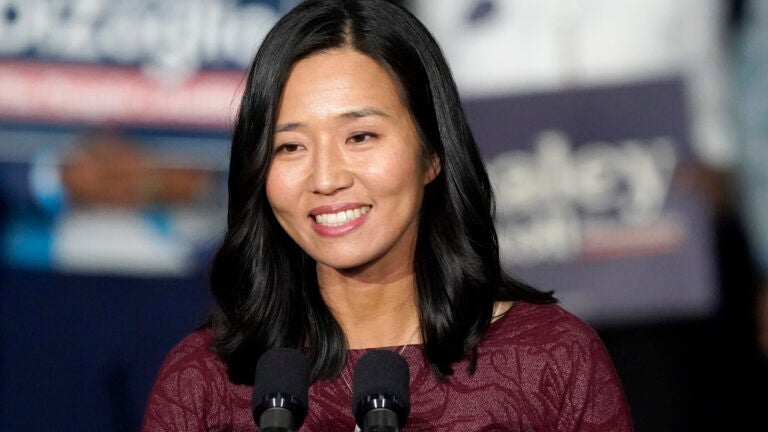Boston.com Today
Sign up to receive the latest headlines in your inbox each morning.

On Thursday morning, Boston Mayor Michelle Wu took to the stage inside the Harvard Club of Boston to speak about the city’s hiring practices with Boston Globe reporter Katie Johnston. The conversation, part of this year’s Globe Summit, touched on a number of issues impacting how the city hires new workers and what Wu’s administration is doing to incentivize them to work and live in Boston.
During her remarks, Wu reflected on how the city’s hiring practices have evolved over her time as mayor. When she took office in 2021, Wu said her administration focused immediately on negotiating new contracts with employee unions and collective bargaining units. Many of the city’s roughly 23,000 employees are part of these groups, and at the time an unprecedented 48 bargaining units had expired contracts.
The vast majority of the city’s workforce had not had pay increases tied to the cost of living in some time, and there were many vacancies. These openings were concentrated in areas where people had more lucrative options outside the public sector. But those are also some of the most important jobs in the city, Wu said, referring to jobs like being a school bus driver, a 911 call center operator, a snowplow or street sweeper driver, or an information technology employee.
“We had a lot of hiring to do and had to rethink it in order to compete among all the different industries,” Wu said.
So, according to Wu, the city changed its approach to how it supports its municipal workforce. This was done by creating the People Operations Cabinet and the Worker Empowerment Cabinet. The former was meant to shift the city’s human resources operations away from a “pure HR mindset” toward one that supports professional development and empowers workers to see municipal work as a career ladder with continuous support.
The Worker Empowerment Cabinet was designed to build the city’s own “in-house hiring pipelines,” Wu said. As an example, Wu said that when the city previously needed to hire bus drivers, it specifically sought out applicants that already had their commercial driver’s license (CDL). Now, the city is taking interested community members in and paying them to get their CDL before being hired. Similar practices are being implemented for emergency medical technicians and some roles in the parks department.
Boston is shifting away from job fairs, where fliers were handed out and people took home information about jobs that they could apply to later, and putting greater emphasis on “hiring days.” During these events, staff are prepared to take resumes and interview applicants on the spot.
Boston has hired about 7,500 people so far in 2024. The goal, Wu said, is to have a “focused, one-stop shop” for community members to directly step into open positions. These “hiring days” are most effective when people know that there are immediate openings, so the city is ramping up outreach through advertising campaigns in places like transit stations and the waiting rooms of doctor’s offices.
Making city jobs accessible to a wide talent pool is key, Wu said.
“We are looking for great people. We’re not looking for the perfect answer to X, Y, Z questions or needing someone to be able to recite the city charter or anything like that. This is about coming and just talking about who you are, what you’ve done, and be able to share your own experience,” she said.
Wu said her administration is in the process of reviewing thousands of job descriptions and seeing if some college degree requirements can be removed. When asked about what specifically the city looks for in new hires, Wu emphasized that many municipal jobs are about reliability and a willingness to take feedback from residents. Those that live in the city already can have an advantage here because they have seen how these systems work firsthand.
Multiple members of the Boston City Council recently raised concerns about the residency requirements tied to many jobs. As the cost of living in Boston gets more expensive and staffing shortages in some areas persist, eliminating the requirements could help the city recruit and retain talent, they said.
Wu acknowledged that these requirements could be a factor, as housing in Boston is at a “crisis” point. The gaps between housing supply and demand, and the subsequent price increases, are causing “tremendous pressure and displacement” in the city, she added.
Wu pushed back on the perception that a lot of the jobs opening up in Boston are tech jobs that require specialized backgrounds, and that companies are therefore predominantly looking around the country and around the world for applicants instead of at locals. Wu said her focus is getting companies to recruit from everywhere.
Increasing the number of jobs in any community is a “win-win” for residents and companies, Wu said. However, she stressed that infrastructure needs to be in place to support those workers.
“The only wrinkle in that is if you end up not being able to have the infrastructure to support a growing population base,” she said. “We are working very hard at the same time as recruiting everyone to come, to make sure that people not only want to be here because they have the jobs, but can afford to be here with housing and transportation infrastructure and what we always talk about.”
Sign up to receive the latest headlines in your inbox each morning.